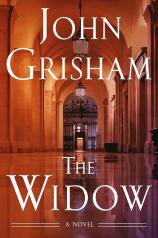The Widow
Review
The Widow
The fall season brings us beautiful autumn colors, college football, the World Series, Halloween, Thanksgiving --- and another John Grisham novel. Since 1991, when THE FIRM burst onto the scene, Grisham’s works consistently have occupied a position on the New York Times bestseller list. In addition to his extraordinary writing career, he has a strong determination to expose many of the difficulties existing in the American legal system. To top it off, he writes what a fictional English judge described as “crackling good yarns.”
In the opening pages of THE WIDOW, readers meet Simon Latch, a struggling attorney who operates a one-man office in a small Virginia community. The building that he owns is subject to a hefty mortgage and includes an apartment on the second floor. Because of difficulties in his marriage, Simon often spends his evenings alone in his apartment and away from his wife and three children.
"The best tribute I can offer is to simply observe that this novel is 'a Grisham.' Whether it is your first or your 50th, it is a wonderful read."
There is little to show for Simon’s 18 years of practice. His cases consist of bankruptcies, foreclosures, small-time personal injuries, minor traffic offenses, divorces where the parties have no assets to quarrel over, and the occasional will. For $250, he will prepare a three-page document distributing what his clients had acquired during their lives. Sadly, most of these wills are not even necessary. Now in his mid-40s, Simon is burned out.
Then one day, Eleanor Barnett shows up at Simon’s office. As a widow with no immediate family, Eleanor’s will appears to be routine. But during the interview, she hints that there may be something more. She says that she inherited substantial stocks and other assets from her late husband with a potential value of several million dollars. Simon realizes this cannot be one of his three-page documents. Instead, he quickly must draft a thorough will that will provide him with the opportunity to administer Eleanor’s estate after she dies. If he succeeds, he will earn a significant financial reward.
Eleanor seems more than willing to have Simon serve as her attorney. A will is prepared, but he must keep her allegiance. He holds regular conferences and frequently takes her to lunch. There is a reason for these actions. He has not yet verified the existence of the assets she claims to own. Then, suddenly, Eleanor is involved in a serious car accident and is hospitalized. After a short period of time in the hospital, she dies.
Simon finds himself back in court, but not as a lawyer. Instead, he is a defendant facing a murder charge. As Grisham acknowledged in a social media post prior to the book’s release, he has added for the first time a whodunit aspect to his traditional legal-themed novels.
During his nearly 40-year writing career, Grisham has used his books as a sounding board for a number of important topics: corruption by corporations, the influence of money in judicial campaigns, the tension between the law and justice, the death penalty and the evil of wrongful convictions. Many of these issues appear in THE WIDOW. The best tribute I can offer is to simply observe that this novel is “a Grisham.” Whether it is your first or your 50th, it is a wonderful read.
Reviewed by Stuart Shiffman on October 24, 2025




